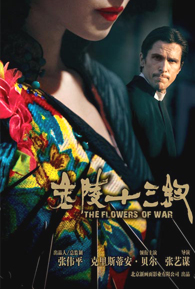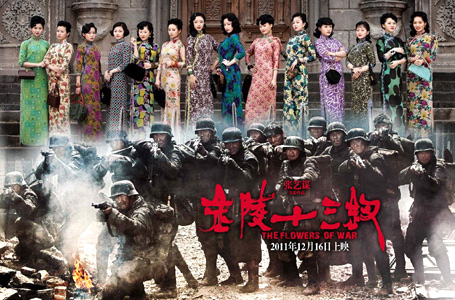
Given that the massacre during the occupation of Nanking, the Opium War, and the Boxer Rebellion remain sore points in China's century of humiliation and have been liberally used as rallying points for Chinese national education and ultra-nationalism since the Mao era (where more people died thanks to Mao's Great Leap Forward than the Japanese ever killed in two Sino-Japanese wars), we have to understand that like much of the novels and films on these subjects, there is no room for anything other than black and white. To flout this rule even today would be suicidal for any Chinese novelist or filmmaker.
Zhang tries his best to escape the broad strokes and coarse melodrama that Geling Yen's original novel employs and we applaud him for that. Amidst the scenes of extensive and graphic violence and rape, the are a few scenes of incongruous beauty – colourful shards of stained glass exploding from windows in slow motion seem to be his signature here.
Sadly for us, Zhang's attention to visuals as a means of ameliorating the shrillness of Yen's novel does not extend to the script. And the problem is Yen's novel consists of a kitchen sink's worth of stock clichés held together by broad and lazy writing. All Japanese soldiers are unrelentingly evil and monstrous. There is the Japanese senior officer who appreciates classical music so much, he stops by the cathedral to listen to the convent girls sing a choral piece. Then plays a piece of his own for them on the organ and demands they sing for him in a private party. There is the whore with a heart of gold or more precisely, 14 whores with hearts of gold! Of course, there is the valiant soldier who refuses to retreat from the city and takes out an entire Japanese platoon intent on raping the convent girls.
Yimou and Yen's take on and depiction of the occupation of Nanking are tiresomely shrill, xenophobic, and ultra-nationalistic. It is very understandable since for Chinese authors and filmmakers, it is impossible to be otherwise. There is a Mao-era film tradition in the People's Republic of China, best described as the Two Minutes Hate stretched to feature film length. Whether it's about the Boxer Rebellion or the Opium War, these black and white agitprop films were designed to stoke a righteous, inchoate rage over the national humiliation of the Chinese at the hands of the foreign Other. It was an animalistic, rapacious Other that plotted the plunder of Chinese soil and whose agents gleefully plotted the deflowering of young Chinese maidens.
The ideal audience for The Flowers of War existed during the Cultural Revolution when it was okay for films in China to do all that. They would have lapped it all up. Right now though? Considering other Chinese filmmakers (Lu Chuan with City of Life and Death) are producing more evenhanded films about the incidents, the occupation of Nanking and its victims do not deserve to be memorialised by a throwback to nasty, jingoistic agitprop – even if it's so beautifully made by Zhang Yimou. A good remedy for this would be to read a novel that not only is female-oriented, but is also far more evenhanded about both the horrors and the truths in the occupation of Nanjing: Nanjing Requiem, by the Chinese-American writer Ha Jin.












 Printable Version
Printable Version










